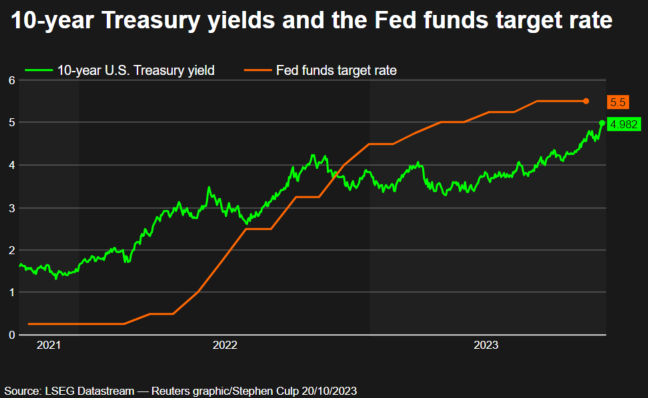NEW YORK, Oct 20 (Reuters) – Wall Street ended lower on Friday as investors closed the book on a week marked with mixed earnings, warnings of possible further interest rate hikes from the Federal Reserve, and worries of escalation of the Middle East conflict.
The yield on 10-year U.S. Treasury notes was briefly bid above the 5% barrier on Thursday for the first time since July 2007, touching 5.001%.
While the benchmark yield eased back from that level, it posted its largest weekly surge since April 2022, powered by solid economic data.
All three major U.S. stock indexes extended their losses as the session progressed, with interest rate-sensitive tech and tech-related megacaps pulling the Nasdaq down 1.5%.
All three indexes registered week-on-week losses.
“Investor sentiment is quite negative, and we believe it’s important to zoom out and focus on the long term – even the intermediate term – and a lot of this will fall by the wayside,” said Ross Mayfield, investment strategy analyst at Baird in Louisville, Kentucky.
“There’s not enough attention being paid to company earnings, which have been coming in strong, and guidance has been solid,” Mayfield added. “Investors would be wise to pay attention to that as much as the macro events, the geopolitical tensions.”
Market participants also digested remarks from Federal Reserve Chairman Jerome Powell that left the door open to an additional rate hike while other Fed officials have hinted that the tightening cycle could be at an end.
“(Investors are) digesting comments from (Fed) Chairman Powell and putting them into context with remarks of other Fed speakers who have suggested that the move upward in Treasury yields is helping the Fed tighten conditions,” said Tom Hainlin, national investment strategist at U.S. Bank Wealth Management in Minneapolis. “And perhaps there’s lower probability that the Fed will have to raise interest rates further.”
Strong U.S. retail sales in September reinforced ideas that the Fed may need to keep interest rates high for longer, Hainlin said.
Third-quarter earnings season has hit full stride, with 86 companies in the S&P 500 having reported. Of those, 78% have delivered results above expectations, according to LSEG.
Geopolitical tensions dampened investor risk appetite as Israel leveled a northern Gaza district.
The Dow Jones Industrial Average (.DJI) fell 286.89 points, or 0.86%, to 33,127.28; the S&P 500 (.SPX) lost 53.84 points, or 1.26%, to 4,224.16; and the Nasdaq Composite (.IXIC) dropped 202.37 points, or 1.53%, to 12,983.81.
European shares extended their sell-off, ending the week at their lowest level in seven months as mounting tensions in the Middle East, climbing interest rates and disappointing earnings dampened investor risk appetite.
The pan-European STOXX 600 index (.STOXX) lost 1.36% and MSCI’s gauge of stocks across the globe (.MIWD00000PUS) shed 1.10%.
Emerging market stocks lost 0.53%. MSCI’s broadest index of Asia-Pacific shares outside Japan (.MIAPJ0000PUS) closed 0.6% lower, while Japan’s Nikkei (.N225) lost 0.54%.
The yield on U.S. 10-year Treasury notes, the bedrock of the global financial system, pulled back after breaching the 5% level late Thursday.
Even so, the benchmark yield nabbed its biggest weekly gain in over a year as robust economic data continues to surprise to the upside, despite the Fed’s restrictive policy rates.
Benchmark 10-year notes last rose 19/32 in price to yield 4.9094%, from 4.988% late on Thursday.
The 30-year bond last rose 13/32 in price to yield 5.0721%, from 5.102% late on Thursday.
The dollar briefly touched the closely watched 150 level against the Japanese yen on Friday, boosted by rising Treasury yields and Powell hinted at the possibility of additional policy rate hikes.
The greenback was nominally lower against a basket of world currencies.
The dollar index (.DXY) fell 0.07%, with the euro up 0.12% to $1.0592.
The Japanese yen weakened 0.04% versus the greenback at 149.86 per dollar, while Sterling was last trading at $1.216, up 0.14% on the day.
Oil prices turned modestly lower but notched their second straight weekly gain as the potential escalation of the Israel-Hamas war stoked supply concerns.
U.S. crude fell 0.69% to settle at $88.75 per barrel, while Brent settled at $92.16 per barrel, down 0.24% on the day.
Gold extended its advance, nearing the key $2,000 per ounce level as geopolitical tensions enhanced the metal’s safe-haven appeal.
Spot gold added 0.3% to $1,979.90 an ounce.
Reporting by Stephen Culp; Additional reporting by Marc Jones in London; Editing by Rod Nickel and Jonathan Oatis
: .


